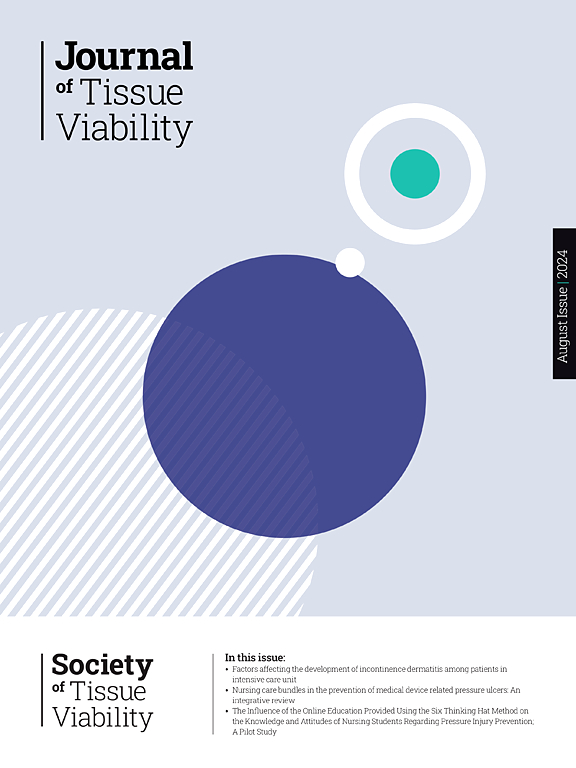Nurses' practices in preventing medical device-related pressure injuries in neonates in Saudi Neonatal Intensive Care Units
IF 2.4
3区 医学
Q2 DERMATOLOGY
引用次数: 0
Abstract
Background
Neonatal pressure injury due to medical devices is prevalent, especially in the Neonatal Intensive Care Units (NICU). Nurses play a significant role in preventing medical device-related pressure injuries (MDRPI) in neonates. However, NICU nurses' practices in preventing MDRPI are not well known in Saudi Arabia.
Objective
This study aimed to assess nurses' practices in preventing the MDRPI in the NICU in Saudi Arabia.
Methods
A quantitative cross-sectional design was used to capture information from 82 NICU nurses working in two hospitals in Jeddah, Saudi Arabia (private and governmental). Nurses' practices were assessed using a self-reported questionnaire of two main parts: 1) demographic and work-related factors, and 2) nurses' practices regarding preventing MDRPI. Data were analyzed using descriptive statistics, frequencies, percentages, and independent t-tests.
Results
The total practice score for the MDRPI was moderate (3.8/5 ± 1.4). A substantial proportion of nurses never or rarely performed some important practices to prevent MDRPI in the NICU. Nurses who received education/training on pressure ulcers and MDRPI achieved a significantly higher practice score for MDRPI prevention than those who did not (P < 0.05). Nurses who reported having a policy or protocol at their units for MDRPI achieved a significantly higher practice score for MDRPI prevention than those who did not (P < 0.05).
Conclusion
Although the practice score of NICU nurses to prevent MDRPI was moderate, many nurses never or rarely employed some important practices to prevent MDRPI in the NICU. Targeted interventions are needed to educate NICU nurses on MDRPI prevention. Future research should recruit more nurses from various NICUs in Saudi Arabia.
在沙特新生儿重症监护病房,护士在预防新生儿医疗器械相关压力损伤方面的实践
背景医疗设备导致的新生儿压力损伤非常普遍,尤其是在新生儿重症监护病房(NICU)。护士在预防新生儿医疗器械相关压力损伤(MDRPI)方面发挥着重要作用。本研究旨在评估沙特阿拉伯新生儿重症监护室护士在预防 MDRPI 方面的实践情况。研究方法采用定量横断面设计,从沙特阿拉伯吉达市两家医院(私立医院和公立医院)的 82 名新生儿重症监护室护士处获取信息。采用自我报告问卷对护士的做法进行评估,问卷主要包括两部分:1)人口统计学和工作相关因素;2)护士预防 MDRPI 的做法。数据采用描述性统计、频率、百分比和独立 t 检验进行分析。有相当一部分护士从未或很少在新生儿重症监护室中实施一些预防 MDRPI 的重要措施。接受过压疮和 MDRPI 教育/培训的护士在预防 MDRPI 方面的实践得分明显高于未接受过教育/培训的护士(P < 0.05)。结论虽然 NICU 护士在预防 MDRPI 方面的实践得分中等,但许多护士从未或很少采用一些重要实践来预防 NICU 中的 MDRPI。需要采取有针对性的干预措施,对 NICU 护士进行预防 MDRPI 的教育。未来的研究应从沙特阿拉伯的各个新生儿重症监护室招募更多护士。
本文章由计算机程序翻译,如有差异,请以英文原文为准。
求助全文
约1分钟内获得全文
求助全文
来源期刊

Journal of tissue viability
DERMATOLOGY-NURSING
CiteScore
3.80
自引率
16.00%
发文量
110
审稿时长
>12 weeks
期刊介绍:
The Journal of Tissue Viability is the official publication of the Tissue Viability Society and is a quarterly journal concerned with all aspects of the occurrence and treatment of wounds, ulcers and pressure sores including patient care, pain, nutrition, wound healing, research, prevention, mobility, social problems and management.
The Journal particularly encourages papers covering skin and skin wounds but will consider articles that discuss injury in any tissue. Articles that stress the multi-professional nature of tissue viability are especially welcome. We seek to encourage new authors as well as well-established contributors to the field - one aim of the journal is to enable all participants in tissue viability to share information with colleagues.
 求助内容:
求助内容: 应助结果提醒方式:
应助结果提醒方式:


